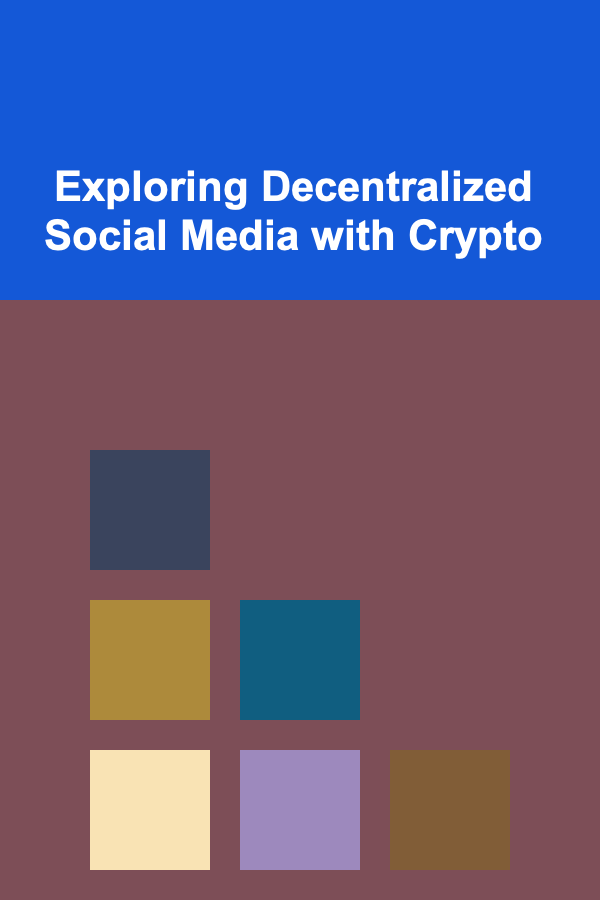
Exploring Decentralized Social Media with Crypto
ebook include PDF & Audio bundle (Micro Guide)
$12.99$5.99
Limited Time Offer! Order within the next:

The internet, once hailed as a beacon of decentralization and free information, has gradually become dominated by a handful of centralized giants. Social media platforms, in particular, are controlled by these corporations, granting them immense power over user data, content moderation, and even the very fabric of online discourse. This concentration of power has led to growing concerns about privacy, censorship, and the manipulation of public opinion. In response to these issues, a new paradigm is emerging: decentralized social media, powered by the principles of blockchain technology and cryptocurrency. This article delves into the world of decentralized social media, exploring its potential benefits, challenges, and the role crypto plays in shaping its future.
The Problems with Centralized Social Media
To understand the appeal of decentralized social media, it's crucial to acknowledge the inherent problems within the existing centralized model:
- Data Privacy Concerns: Centralized platforms collect vast amounts of user data, often without explicit consent or transparent data handling practices. This data is then used for targeted advertising, potentially shared with third parties, or even vulnerable to breaches and misuse. Users have limited control over their own information and how it is used.
- Censorship and Content Moderation: Centralized platforms have the power to censor content and ban users based on their own policies, which can be opaque, inconsistent, and subject to bias. This can stifle free speech and create echo chambers, limiting exposure to diverse perspectives. The line between legitimate content moderation and censorship is often blurred.
- Lack of Transparency: The algorithms that govern content ranking and recommendation are often opaque and proprietary. Users have little understanding of why certain content is promoted while others are suppressed, leading to concerns about manipulation and hidden agendas.
- Monetization Models: Centralized platforms primarily generate revenue through advertising, which incentivizes them to prioritize engagement and "sticky" content, even if it is harmful or misleading. Users are essentially the product, their attention being sold to advertisers. Creators often receive a disproportionately small share of the revenue generated from their content.
- Single Point of Failure: Centralized servers represent a single point of failure. If a server is compromised or goes down, the entire platform is affected. This also makes platforms vulnerable to censorship attempts by governments or other powerful entities.
What is Decentralized Social Media?
Decentralized social media aims to address these problems by shifting control away from centralized entities and empowering users. It leverages blockchain technology and cryptocurrency to create platforms that are:
- User-Owned and Controlled: Users have ownership and control over their data and content, often stored on a decentralized network or blockchain.
- Resistant to Censorship: Content is distributed across multiple nodes, making it extremely difficult, if not impossible, for any single entity to censor or remove it.
- Transparent and Open Source: The underlying code and algorithms are often open source, allowing for greater transparency and community oversight.
- Monetized Differently: Creators can be directly rewarded for their contributions through cryptocurrency, micropayments, or other alternative monetization models, cutting out the middleman.
- More Resilient: Distributed networks are inherently more resilient to outages and attacks than centralized systems.
Key Technologies and Concepts
Several key technologies and concepts underpin the functionality of decentralized social media:
- Blockchain Technology: A distributed, immutable ledger that records transactions and data across a network of computers. This provides transparency, security, and resistance to censorship. Different blockchains are used for different decentralized social media platforms, each with its own characteristics and trade-offs.
- Cryptocurrency: Digital or virtual currency that uses cryptography for security and operates independently of a central bank. Cryptocurrencies are used to incentivize user participation, reward content creators, and facilitate transactions within decentralized social media platforms.
- Decentralized Identifiers (DIDs): A globally unique identifier that enables individuals to control their own digital identity without relying on centralized authorities. DIDs are crucial for establishing verifiable credentials and ensuring user autonomy in decentralized social media.
- InterPlanetary File System (IPFS): A decentralized storage system that allows users to store and share files across a distributed network. IPFS is often used to store content, images, and videos in decentralized social media platforms.
- Decentralized Autonomous Organizations (DAOs): Organizations governed by rules encoded in smart contracts on a blockchain. DAOs can be used to manage decentralized social media platforms, allowing users to participate in governance decisions and shape the future of the platform.
- Smart Contracts: Self-executing contracts written in code and stored on a blockchain. They automatically enforce the terms of an agreement, ensuring transparency and eliminating the need for intermediaries. Smart contracts can be used to automate various functions within decentralized social media platforms, such as content moderation, revenue sharing, and user governance.
Examples of Decentralized Social Media Platforms
The decentralized social media landscape is rapidly evolving, with new platforms emerging regularly. Here are a few notable examples:
- Mastodon: A decentralized microblogging platform that is often considered an open-source alternative to Twitter. It consists of independent, self-governed servers (called "instances") that can communicate with each other, forming a federated social network. Users can choose an instance that aligns with their values and interests, and they have more control over their data and content.
- Peepeth: A Twitter-like platform built on the Ethereum blockchain. Users pay a small fee in Ether to post "peeps," which are permanently stored on the blockchain. This makes Peepeth resistant to censorship, as content cannot be easily deleted or altered. The platform is known for its simplicity and focus on privacy.
- Steemit: A blockchain-based social media platform that rewards users with cryptocurrency (STEEM and Steem Dollars) for creating and curating content. Users can earn rewards by posting articles, commenting, and voting on other users' posts. Steemit aims to incentivize high-quality content and foster a vibrant community.
- Minds: A decentralized social network that emphasizes free speech and privacy. Users can earn tokens for contributing to the platform, such as creating content, referring new users, and participating in discussions. Minds offers end-to-end encryption for private messages and allows users to opt out of tracking.
- LBRY: A decentralized content-sharing platform that allows creators to publish and monetize their work directly without relying on intermediaries. Users can earn LBRY Credits (LBC) for creating and consuming content, and they can use LBC to support their favorite creators. LBRY offers a variety of content formats, including videos, music, and ebooks.
- DTube: A decentralized video-sharing platform similar to YouTube, built on the Steem blockchain. Creators earn cryptocurrency rewards for their videos, and users can earn rewards for watching and curating content. DTube aims to provide a more equitable and transparent video-sharing experience.
- Mirror: A decentralized publishing platform built on Ethereum. It allows writers to own their content and earn cryptocurrency for their work. Mirror emphasizes community ownership and allows users to participate in governance decisions.
The Role of Crypto in Decentralized Social Media
Cryptocurrencies play a vital role in the functioning and sustainability of decentralized social media platforms. Here's how:
- Incentivizing Participation: Cryptocurrencies can be used to reward users for creating and curating content, referring new users, and participating in platform governance. This helps to attract and retain users, fostering a vibrant and active community.
- Monetizing Content: Creators can earn cryptocurrency directly from their audience through micropayments, subscriptions, or donations. This allows them to bypass traditional advertising models and retain a greater share of the revenue generated from their work.
- Enabling Micropayments: Cryptocurrencies facilitate small, frequent payments, which are ideal for rewarding individual pieces of content or for paying for access to premium features.
- Facilitating Governance: Cryptocurrencies can be used to grant voting rights to users, allowing them to participate in governance decisions and shape the future of the platform. Token-based voting systems can ensure a fair and transparent decision-making process.
- Providing Economic Incentives for Node Operators: Decentralized networks rely on a network of nodes to store and distribute data. Cryptocurrencies can be used to incentivize node operators to provide reliable and secure infrastructure.
- Funding Development: Cryptocurrencies can be used to fund the development of decentralized social media platforms through Initial Coin Offerings (ICOs), token sales, or grants from decentralized autonomous organizations (DAOs).
Benefits of Decentralized Social Media
Decentralized social media offers several potential benefits over traditional centralized platforms:
- Enhanced Privacy: Users have greater control over their data and can choose to share only the information they are comfortable with. Decentralized platforms often prioritize privacy-preserving technologies and limit the collection of personal data.
- Reduced Censorship: Content is more difficult to censor or remove, promoting freedom of expression and diverse perspectives. The decentralized nature of the network makes it resistant to manipulation by governments or corporations.
- Greater Transparency: Open-source code and transparent algorithms allow users to understand how the platform works and how their data is being used.
- Fairer Monetization: Creators can earn a greater share of the revenue generated from their content, empowering them to build sustainable careers.
- Community Ownership: Users can participate in governance decisions and shape the future of the platform, fostering a sense of community and ownership.
- Increased Security: Distributed networks are more resilient to outages and attacks than centralized systems.
Challenges of Decentralized Social Media
Despite its potential, decentralized social media also faces several challenges:
- Scalability Issues: Blockchain technology can be slow and expensive, which can limit the scalability of decentralized social media platforms. Processing transactions and storing data on a blockchain can be resource-intensive.
- User Experience: Decentralized platforms can be more complex to use than traditional social media platforms, requiring users to manage their own wallets and understand blockchain technology.
- Content Moderation: The difficulty of censoring content can also make it challenging to moderate harmful or illegal content. Striking a balance between freedom of expression and platform safety is a crucial challenge.
- Network Effects: Centralized platforms benefit from strong network effects, making it difficult for decentralized platforms to attract a critical mass of users.
- Regulatory Uncertainty: The regulatory landscape surrounding cryptocurrency and decentralized technology is still evolving, which can create uncertainty and hinder adoption.
- Security Risks: Decentralized platforms are vulnerable to hacking and other security risks, particularly if they rely on poorly designed smart contracts or weak security protocols.
- Centralization Creep: Despite the intention of decentralization, certain aspects of platforms might become unintentionally centralized, such as node distribution or development influence.
Overcoming the Challenges
Addressing these challenges is crucial for the long-term success of decentralized social media. Possible solutions include:
- Scalability Solutions: Developing more efficient blockchain technologies and implementing layer-2 scaling solutions can improve the scalability of decentralized platforms. Examples include sidechains, rollups, and state channels.
- Improved User Experience: Designing more user-friendly interfaces and providing better educational resources can make decentralized platforms more accessible to a wider audience. Abstracting away the complexities of blockchain technology can improve the user experience.
- Decentralized Moderation Systems: Implementing decentralized moderation systems that rely on community consensus or reputation-based systems can help to address harmful content while preserving freedom of expression.
- Incentivizing Adoption: Offering attractive incentives and building strong communities can help to attract users to decentralized platforms. Focusing on niche communities and specific use cases can also be effective.
- Collaboration and Standardization: Promoting collaboration between different decentralized platforms and developing common standards can improve interoperability and reduce fragmentation.
- Security Audits and Best Practices: Conducting regular security audits and following best practices for smart contract development can help to mitigate security risks.
The Future of Decentralized Social Media
Decentralized social media is still in its early stages, but it has the potential to fundamentally transform the way we interact online. As blockchain technology matures and the challenges are addressed, we can expect to see:
- Greater Adoption: More users will migrate to decentralized platforms as they become more user-friendly and offer compelling alternatives to centralized platforms.
- Increased Innovation: New and innovative features will emerge as developers experiment with different blockchain technologies and monetization models.
- Integration with Other Decentralized Applications: Decentralized social media platforms will increasingly integrate with other decentralized applications, such as decentralized finance (DeFi) and decentralized storage.
- A More Equitable and Transparent Internet: Decentralized social media will contribute to a more equitable and transparent internet, where users have greater control over their data and content.
- The rise of new social norms: The very nature of online interaction could shift as censorship resistance and user ownership create novel challenges and opportunities for online communication and community building.
Getting Started with Decentralized Social Media
If you're interested in exploring decentralized social media, here are a few steps you can take:
- Research Different Platforms: Explore the various decentralized social media platforms mentioned above and choose one that aligns with your interests and values.
- Set up a Cryptocurrency Wallet: You'll need a cryptocurrency wallet to interact with most decentralized platforms. Popular options include MetaMask, Trust Wallet, and Ledger.
- Acquire Cryptocurrency: You'll need to acquire some cryptocurrency to pay for transactions and participate in the platform's ecosystem. You can purchase cryptocurrency on a cryptocurrency exchange like Coinbase, Binance, or Kraken.
- Create an Account: Create an account on the chosen decentralized social media platform.
- Start Exploring and Participating: Browse the platform, connect with other users, and start creating and curating content.
- Engage with the Community: Join the platform's community forums or social media channels to learn more and connect with other users.
- Stay Informed: Keep up with the latest developments in the decentralized social media space by following industry news and blogs.
Conclusion
Decentralized social media represents a promising alternative to the centralized platforms that currently dominate the internet. By leveraging blockchain technology and cryptocurrency, these platforms empower users, promote freedom of expression, and foster a more equitable and transparent online environment. While challenges remain, the potential benefits of decentralized social media are significant, and its continued development could reshape the future of online communication and community building. Exploring this emerging landscape requires a willingness to learn and adapt, but the potential rewards -- a more democratic and user-centric internet -- are well worth the effort. The journey towards a truly decentralized social web is underway, and its success will depend on the collective effort of developers, users, and policymakers alike.

How to Celebrate Budgeting Milestones for Motivation
Read More
How to Highlight Your Home's Best Features with Strategic Staging
Read More
How to Organize Your Car for Long Commutes
Read More
How to Discover the Romantic Streets of Lisbon
Read More
Overcoming Emotional Eating for Weight Loss: A Deep Dive
Read More
10 Tips for Organizing Your Family's School Supplies
Read MoreOther Products

How to Celebrate Budgeting Milestones for Motivation
Read More
How to Highlight Your Home's Best Features with Strategic Staging
Read More
How to Organize Your Car for Long Commutes
Read More
How to Discover the Romantic Streets of Lisbon
Read More
Overcoming Emotional Eating for Weight Loss: A Deep Dive
Read More